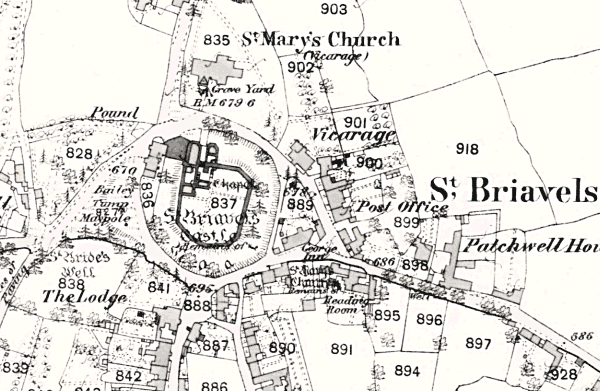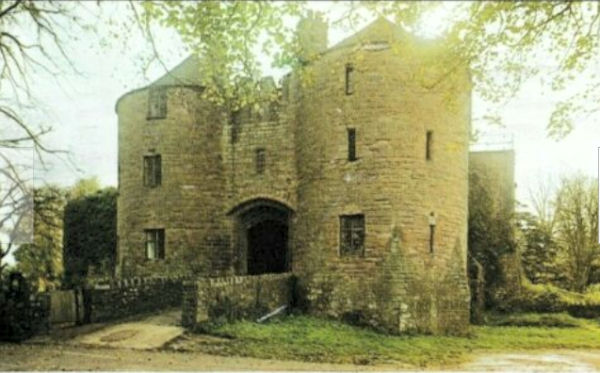St Briavel's Castle, Gloucestershire
Dating from the early 12th century, St Briavel's was an important royal castle on the English-Welsh border and the administrative and judicial centre of the Forest of Dean. The castle was the residence of the warden of the Forest of Dean, then the king's personal hunting ground. The area was also an important centre of the medieval iron industry, and crossbow bolts were manufactured at the castle.
The castle gatehouse became a prison where those accused of committing offences within the forest area were held while awaiting trial. It was later used as a debtors' prison.
In 1784, John Howard wrote:
St Brievell's Gaol, for Debtors. The castle is in the forest of Dean, the property of Lord Berkeley, who is the chief ranger. One room for men, greatly out of repair: no court: no water: no allowance: no firing. One of the two sickly objects I found there, told me he had been confined a twelvemonth, and never once out of the dismal and offensive room; the other almost as long.—A room above for women: none there.—Keeper no salary: licence for beer: fees, 2S. 6d. No table.
| 1775, Dec. 4, | Prisoners 2. |
| 1779, June 2, | 0 |
| 1782, Dec. 23, | 0 |
In 1812, James Neild wrote:
Gaoler, William Class. No Salary. No Fees.
Number of Debtors, 1804, Oct. 21st, One. 1806, Sept. 9th, Two.
Allowance, none whatever.
This Gaol, for Debtors only, is part of the old Castle, within the Forest of Dean. The Castle is the property of the Crown; and was formerly surrounded by a moat, which enclosed about a quarter of an acre of ground. It is now held by lease, as I am informed, granted to Lord Berkeley, who is chief Ranger of the Forest, and Constable of the Castle.
Over the Prison gateway is a painted board, inscribed "The Castle Inn: Spirituous Liquors." Company resort to it as to a common ale-house.
Here is one dismal room for Men-Debtors above stairs, 17 feet 10 inches by 16 feet 8; and another for the Women; both greatly out of repair. No bedding allowed, not even straw to sleep on: but the Gaoler furnishes beds, at 1s. per week, to those who can afford to pay for them.
Of the two poor objects, both sickly, whom I found here in 1806, one was Richard Jordan, a labourer, who told me he had a Wife and seven Children; and that, since his confinement, three of them were sent to the Workhouse. His Debt was for Rent, 6l. 5s.; Costs of prosecution 5l. 11s. 6d.; Levy-pence, 19s. 8d.; and bringing to Gaol, 5s. So that the expence exceeded the debt by eleven shillings and two-pence! Such cases cannot be known to Earl Berkeley, who I understand seldom, if ever, visits the town.
This is the only Gaol remaining in the respectable County of Gloucester, that, for construction and polity, is not worthy of imitation. It is without the controul of the excellent County Magistrates: But I have hopes that, through the humane exertions of the great presiding genius of reform here, Sir George Paul, the dreary abode in question will ere long be abolished.
No court-yard. No water, but what is brought by the Gaoler.
Neither the Act for the preservation of Health, nor the salutary Clauses against the use of Spirituous Liquors, are here hung up. The whole Prison very dirty.
The prison site is shown on the 1881 map below.

St Briavel's Castle site, c.1881.

St Briavel's Castle, Gloucestershire.
The prison was closed in 1842. The decaying building was restored at the turn of the 20th century. It is now used as a youth hostel.
Records
Note: many repositories impose a closure period of up to 100 years for records identifying individuals. Before travelling a long distance, always check that the records you want to consult will be available.
- No individual records identified for this establishment — any information welcome.
- The National Archives, Kew, Richmond, Surrey, TW9 4DU. Has a wide variety of crime and prison records going back to the 1770s, including calendars of prisoners, prison registers and criminal registers.
- Find My Past has digitized many of the National Archives' prison records, including prisoner-of-war records, plus a variety of local records including Manchester, York and Plymouth. More information.
- Prison-related records on
Ancestry UK
include Prison Commission Records, 1770-1951
, and local records from London, Swansea, Gloucesterhire and West Yorkshire. More information.
- The Genealogist also has a number of National Archives' prison records. More information.
Bibliography
- Higginbotham, Peter The Prison Cookbook: A History of the English Prison and its Food (2010, The History Press)
- Brodie, A. Behind Bars - The Hidden Architecture of England's Prisons (2000, English Heritage)
- Brodie, A., Croom, J. & Davies, J.O. English Prisons: An Architectural History (2002, English Heritage)
- Harding, C., Hines, B., Ireland, R., Rawlings, P. Imprisonment in England and Wales (1985, Croom Helm)
- McConville, Sean A History of English Prison Administration: Volume I 1750-1877 (1981, Routledge & Kegan Paul)
- Morris, N. and Rothman, D.G. (eds.) The Oxfod History of the Prison (1997, OUP)
- Pugh R.B. Imprisonment in Medieval England (1968, CUP)
Links
- Prison Oracle - resources those involved in present-day UK prisons.
- GOV.UK - UK Government's information on sentencing, probation and support for families.
Except where indicated, this page () © Peter Higginbotham. Contents may not be reproduced without permission.



